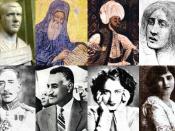Building cultural awareness is not an easy task, and no foolproof method exists for doing so. Culture consists of specific learned norms based on attitudes, values, and beliefs, all of which exist in every nation. Visitors remark on cultural differences, experts write about them, and international businesspeople find that they affect operations. Yet controversy surrounds these differences because people disagree on what they are, whether they are widespread or exceptional differences, and whether the differences are deep-seated or superficial. Further, culture cannot easily be isolated from such factors as economic and political conditions. For example, an opinion survey of a country's citizens that measures, say, attitudes toward buying a new product may reflect a response to temporary economic conditions rather than basic values and beliefs that will have lasting effects on the product's acceptance.
Some differences, such as those regarding acceptable attire, are discerned easily; others may be more difficult to perceive.
All people have culturally ingrained responses to given situations and sometimes expect that people from other cultures will respond the same way as people in their own culture do. In the opening case, the British salesman for PRI budgeted their time and so regarded drinking coffee and chatting about nonbusiness activities in a café as "doing nothing," especially if there was "work to be done." In fact, their compensation system did not give them the privilege of spending much time on each business transaction. The Arab businessmen had no compulsion to finish at a given time, viewed time spent in a café as "doing something," and considered "small talk" an indication of whether they could get along with potential business partners. Because the Englishmen believed "you shouldn't mix business and pleasure," they became irritated when friends of the Arab businessmen joined their conversations. In contrast, the Arabs felt...


